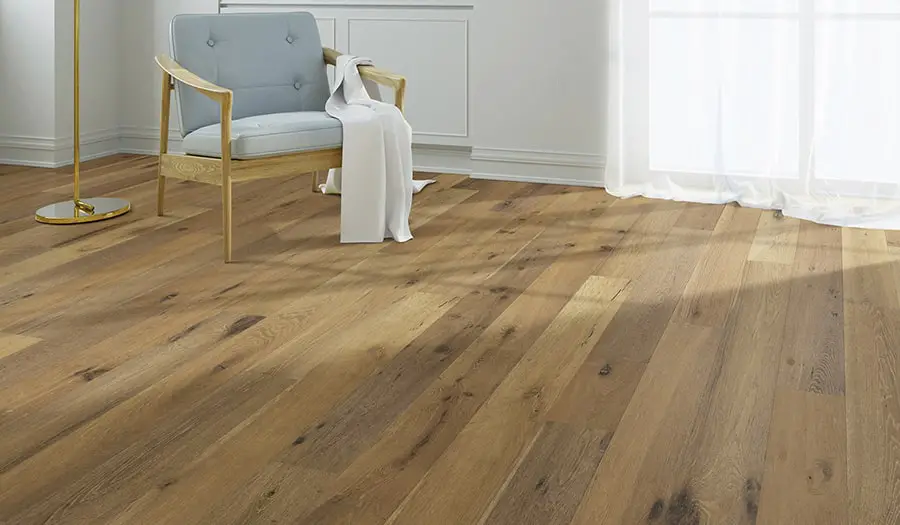If you’re considering buying engineered hardwood floors for your home, you are making a wise decision. Engineered hardwoods are strong, durable, and look fantastic too. Plus, they are relatively easy to install compared to other types of flooring.
But how do you know what type is right for you? Let’s take a look at the process of buying engineered hardwood floors and what factors you should consider when making your purchase.
Evaluating Your Needs
The first step in buying new engineered hardwood floors is to evaluate your needs. Think about the overall look that you want to create in the room or space where the floor will be installed.
Then consider the amount of foot traffic that will pass over it on a daily basis, as this will affect how many layers are needed in each plank and how much wear and tear it can handle before it needs to be replaced.
Make sure to measure the room accurately so that you know just how much flooring material you need before heading out to shop around.
Measure Twice, Buy Once!
Once you have determined your needs, it’s time to start shopping around. Take some time to compare different brands and styles of engineered hardwood floors so that you can find one that meets both your aesthetic preferences and practical requirements.
Don’t forget to read reviews online from previous buyers this is an important part of ensuring that the product is up-to-scratch when it comes to quality control standards.
It’s also important not to buy more than what’s necessary; measure twice, and buy once!
What is a Good Thickness For Engineered Hardwood?
When considering engineered hardwood, the thickness of a plank is one of the most important factors. Generally, thicker engineered wood planks are more durable and can provide a longer-lasting flooring option.
Planks with 1/2 inch thicknesses or higher are ideal for heavy foot traffic areas as they have greater stability than thinner engineered hardwood planks.
It’s also important to look at the construction of an engineered hardwood plank to make sure that the top hardwood layer is thick enough to be sanded down multiple times should refinishing be required in the future.
Ultimately, it’s best to select an engineered hardwood with a minimum thickness of 3/8 inch thick or above in order to ensure maximum durability and longevity.
Related Topic: How Do You Trim Laminate Flooring With A Router? Safely!
Installation
Finally, if possible try to find someone who specializes in installing engineered hardwood floors in order for them to get the job done correctly and efficiently.
Also be sure that they use compatible types of adhesives which are safe for use on wood surfaces, as well as any additional underlayment materials if required by law or due to local building codes in your area (or if desired for soundproofing or insulation).
This will ensure a secure fit with minimal gaps between planks over time due to warping or shifting of the subfloor beneath them.
Cost Of Engineered Hardwood Floor
Engineered hardwood floor is a great choice for remodeling projects, as it offers the beauty of hardwood but at a fraction of the cost. On average, engineered hardwood can range anywhere from $3 to $14 dollars per square foot.
The overall cost will depend on the type of wood chosen and the size of the area you plan to cover. If you’re planning small-scale renovations or adding an accent wall, you can likely find a reasonable cost per square foot.
On the other hand, if you plan to redo your entire space in engineered wood, you may want to look into wholesale options that could save you hundreds or even thousands of dollars.
Whatever design project you have in mind, engineered hardwood can be an excellent option for budget-conscious homeowners looking for beautiful results without breaking their budgets.
Related Topic: How To Install Lifeproof Rigid Core Luxury Vinyl Flooring? Guide!
Conclusion
Engineered hardwood floors are an excellent way of transforming any room into a luxurious environment with added strength and durability compared with traditional solid wood planks.
By taking the time early on in the process to evaluate your needs, researching different options available on the market today, and using professional help during installation where necessary you can rest assured knowing that your home will look beautiful whilst providing years of service without needing any expensive repairs or replacements down the line!
Investing in quality engineered hardwood floors can add value and elegance not only now but also down the line for future potential buyers should circumstances change!
FAQs
Can I install engineered hardwood myself?
Installing engineered hardwood yourself may seem like a daunting task. However, it is an investment of time and effort that can pay off in the end, and there are many resources available to help you through the process.
With preparation and research, along with some elbow grease, installing your engineered hardwood floors can be a straightforward job without having to call in a professional.
With patience, determination, and following guidelines carefully, you could be adding value to your home with your very own handiwork!
What is a good price for engineered wood flooring?
Engineered wood flooring is an affordable way to upgrade your space. It typically costs between $2 – $12 per square foot, depending on the type of wood and finishes you choose.
Be sure to factor in additional costs like underlayment and installation when calculating what a good price for this flooring might be. Compare different brands and looks online before making a final decision.
Related Topic: How Do You Replace A Piece Of Click Flooring: Is It Possible?
What are the disadvantages of engineered hardwood?
Engineered hardwood has a range of disadvantages that should be considered before deciding on using it. Due to its construction of a thin hardwood layer over multiple layers of plywood, it may not be as durable as traditional solid woods and is more prone to damage from moisture or extended use.
It is also difficult to repair because replacing individual planks can be expensive and challenging. Additionally, even with special techniques, engineered hardwood cannot be refinished the same way as traditional wood, so this limits its lifespan.
Should I float or nail-engineered hardwood?
When it comes to installing hardwood in your home, there are two main installation methods to choose from floating or nail-engineered hardwood. Floating is typically considered easier, as you don’t need to nail down the boards or use a glue agent.
It is also more DIY friendly since all that’s required are planks, underlayment, and a foam core tap under each board. Nailing hardwood also has its benefits it affords a more secure installation for more heavily trafficked areas and provides stability for larger areas of flooring.
Ultimately, both installation types can be great options – it’s just a matter of deciding what’s best for your budget and lifestyle.


There is certainly a great deal to learn about this issue.I love all the points you have made.
Very neat article.Really looking forward to read more. Really Great.